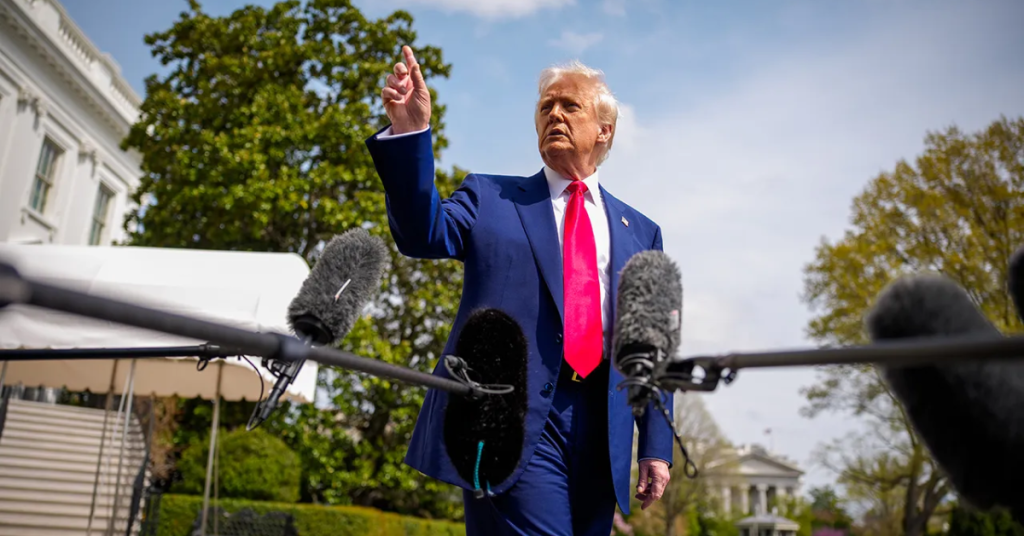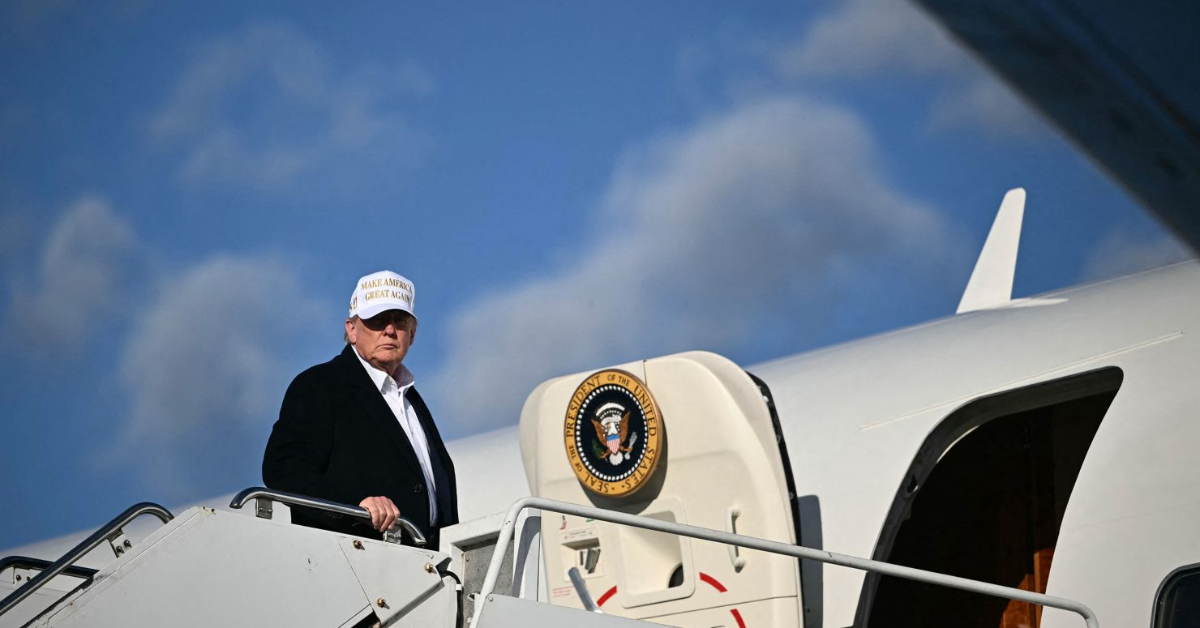Donald Trump, the 45th President of the United States, has never been one to shy away from making bold statements. He frequently speaks of his dominance in global affairs, even going so far as to claim that he runs not just the country, but the world.
His ambition, while undoubtedly large, also presents some critical questions: Where exactly is he taking the world? Is his leadership something that will stabilise international relations, or is it destined to plunge the world into more chaos?
Trump’s most recent claim of running both the country and the world came in an interview with The Atlantic, where he boasted about having rid himself of the “crooked guys” and investigations that hampered his first term.
He promised that his second term would see him in full control, not just of America, but also the global stage. But as lofty as these claims may be, his leadership style and foreign policy are anything but predictable. It raises the question: Where will all this take us?
Trump’s Global Vision
Since his first term, Trump’s foreign policy has been marked by unconventional methods, decisions, and attitudes. Whether it’s his unpredictable stance on international trade or his open admiration for autocrats like Russian President Vladimir Putin and Chinese President Xi Jinping, Trump’s approach to global leadership is unlike anything we’ve seen from previous U.S. Presidents. Many leaders and governments around the world, both allies and adversaries, are forced to pay attention to him, whether they want to or not.
Trump has taken a markedly different approach to American leadership on the global stage compared to his predecessors. While former U.S. Presidents worked through multilateral organisations like the United Nations and NATO, Trump has pursued a more unilateral and transactional form of diplomacy.
He seeks to put “America first,” which often means questioning the role the U.S. plays in international agreements and partnerships. He has called for the renegotiation of trade deals, such as NAFTA, and imposed tariffs on countries like China, creating ripples in the global economy.
The President’s statement that he “runs the world” isn’t just hyperbole. The U.S. has an unparalleled influence on global politics, economics, and military power. From NATO to the UN Security Council, the U.S. plays a critical role in shaping international policies. Trump, with his emphasis on national sovereignty and America’s role in the world, wants to wield that influence as he sees fit, often at the expense of long-standing international relationships.
The Truth Behind Trump’s Influence
As much as Trump’s rhetoric may sound self-aggrandising, there is some truth to his claim. The U.S. plays an outsized role in the global system. America’s military might, its economic power, and its global network of allies ensure that the decisions made in Washington have a profound impact worldwide.
Take Ukraine, for example. The war between Ukraine and Russia is often viewed as a European issue. Still, it is clear that without the U.S.’s military and financial support, European nations would struggle to continue backing Ukraine to the extent needed.

Majda Ruge, a senior policy fellow at the European Council on Foreign Relations, explained, “Without American intelligence, military support, and American nuclear deterrence, Europeans are not able to continue supporting Ukraine to the extent that is needed.” This speaks to the reality of Trump’s influence in global matters—when America makes decisions, the entire world is forced to respond.
However, this influence is also complicated by Trump’s approach to international relations. While his influence is undeniable, the direction in which he is steering the world is highly questionable. Is he leading it toward stability, or is he fostering chaos?
The Risks of Trump’s Unpredictable Leadership
One of the most significant risks posed by Trump’s leadership is his temperament. Trump’s foreign policy often seems to be shaped by his personal feelings and impulses. His approach is personalised to an extent that it is difficult to predict what direction the U.S. might take on any given issue.
Trump’s erratic decision-making has already caused significant disruptions. His trade war with China, for example, has had a considerable impact on global markets. The tariffs imposed on Chinese imports caused a ripple effect, leading to price hikes in goods worldwide and undermining global supply chains. Similarly, his abrupt withdrawal of U.S. troops from Syria and Afghanistan has left the world questioning the reliability of U.S. commitments to its allies.
Moreover, Trump’s tendency to make decisions without consulting his advisors or long-standing policy experts has led to confusion and frustration within his government. He’s known for dismissing expertise in favour of gut instincts, which only adds to the unpredictability of his actions. His love for social media also means that decisions or sentiments are often broadcast without any filtering, making his leadership look even more unpredictable.
The U.S.’s global leadership is under threat not from external forces but from Trump’s volatile approach to governance. His foreign policy often makes other nations feel vulnerable, as they must constantly adjust to his ever-changing whims. The result is a world where alliances are weakening and international cooperation is in decline.
The Toll on Global Alliances
Trump’s foreign policy has put him at odds with many of America’s long-standing allies. European nations, traditionally viewed as key partners of the U.S., have begun to reassess their reliance on Washington. The U.S. under Trump has moved away from promoting human rights and democratic values, which have historically been cornerstones of American foreign policy.
In particular, Trump’s fondness for strongmen like Putin and Xi has alarmed many of the U.S.’s democratic allies. His apparent disregard for the values of human rights, democracy, and international law has led to concerns about whether the U.S. can still be counted on to lead the free world. His strained relationships with NATO allies and his disdain for the European Union have only compounded these fears.
In places like Eastern Europe and Asia, countries that rely on the U.S. for security assurances are beginning to question whether America’s commitment to their defence is still strong. Some countries are even starting to rearm, fearing that they may no longer be able to rely on the U.S. for protection.
Trump’s Worldview: A Dangerous Gamble
Trump’s foreign policy, while often erratic, is rooted in a clearer, albeit troubling, ideological framework. His worldview can be described as “social Darwinism” — a belief that strength should determine success, and the weak should fend for themselves. This philosophy is dangerous because it challenges the values that have underpinned global governance for decades. For countries that rely on the U.S. for military, economic, and diplomatic support, this new approach is a hard pill to swallow.
The U.S. once stood as a beacon of stability, democracy, and cooperation. But under Trump’s leadership, it has become a destabilising force. Countries that once looked to America for guidance now find themselves questioning whether their interests align with the U.S. under Trump.
Conclusion: The Future Under Trump’s Leadership
As we look ahead, it’s clear that Trump’s leadership will leave an indelible mark on global politics. Whether it will be for better or worse is still to be seen. Trump’s aggressive stance on trade, his disregard for international norms, and his unpredictable behaviour have shaken the foundations of the global order.
Will his boldness lead to new opportunities and a reshaped world order, or will his chaotic style undermine the U.S.’s global standing? It’s difficult to say. But one thing is certain: If Trump continues to “run the world,” it will be a far more unpredictable and divisive place. The world waits to see where he will take it — and whether future leaders will be able to undo the damage caused by his erratic approach to global leadership.
Disclaimer: This article has been meticulously fact-checked by our team to ensure accuracy and uphold transparency. We strive to deliver trustworthy and dependable content to our readers.


